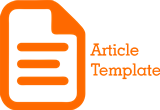Author Guidelines
The manuscript texts are written in English or Indonesia. Manuscripts will be first reviewed by editorial boards. The main text of a manuscript must be submitted as a Word document (.doc) or Rich Text Format (.rtf) file. The manuscript consists of 5000 words (minimum) or writing manuscript articles at least 10 pages with, well-typed in single column on A4 size paper, use 10 pt of Times New Roman or Calisto MT. The manuscript contains an original work and have potentially contribute to the highly scientific advancement.
The manuscript should contain the following section in this order:
a. Title
Title of articles in English should describe the main content of manuscripts, be informative, concise, and not too wordy (12-15 words only), and does not contain formulas.
b. The author s name
Full name without academic degrees and titles, written in capital letters. Manuscript written by groups needs to supplemented by complete contact details.
c. Name of affiliation for each author
The author name should be accompanied by complete affiliation address, postal code number, telephone number and email address.
d. Abstract
Written briefly in English in one paragraph of 150-200 words, containing background, research objectives, methodology, results, conclusion of the study and your research contributions to science.
e. Keywords
Written in English 3-5 words or groups of words, written alphabetically.
f. Introduction
Explaining the background, problems, importance of research, brief literature review that relates directly to research or previous findings that need to be developed, and ended with a paragraph of research purposes. A balance must be kept between the pure and applied aspects of the subject.The introduction is presented in the form of paragraphs of approximately 1000 words.
g. Methods
Make sure that work can be repeated according to the details provided. It contains technical information of the study presented clearly. Therefore, readers can conduct research based on the techniques presented. Materials and equipment specifications are necessary. Approaches or procedures of study together with data analysis methods must be presented.
h. Results and Discussion
Well-prepared tables and or figures must be of significant feature of this section, because they convey the major observations to readers. Any information provided in tables and figures should no longer be repeated in the text, but the text should focus on the importance of the principal findings of the study. In general, journal papers will contain three-seven figures and tables. Same data can not be presented in the form of tables and figures. The results of the study are discussed to address the problem formulated, objectives and research hypotheses. It is higly suggested that discussion be focused on the why and how of the research findings can happen and to extend to which the research findins can be applied to other relevant problems.
i. Conclusion
Conclusion should be withdrawn on the basis of research findings, formulated concerns and research purposes. Conclusion is presented in one paragraph without numerical form of expression. Explain your research contributions to science.
j. Acknowledgement
Contributors who are not mentioned as authors should be acknowledged, and their particular contribution should be described. All sources of funding for the work must be acknowledged, both the research funder and the grant number (if applicable) should be given for each source of funds
k. References
Manuscripts are written by using standard citation application (Mendeley/Endnote/Zotero). APA (American Psychological Association) reference style is required. Citing an article written by two authors, both of authors should be mentioned, however, for three and more authors only the first author is mentioned followed by et al., for example:
Rahayu & Sudarsono (2015), Subekti et al. (2014). A series of references should be presented in ascending date order (Retnoningsih et al., 2005; Indriyanti et al., 2007; Rahayuningsih, 2010).
Different publications with the same author(s) and year will be presented separately, as follows 2013a, 2013b. References of unpublished data and personal communication should not appear in the list but should be cited in the text only (e.g., Rifai MA 2015, pers. com. (personal communication); Indriyanti DR 2014, unpublished data).
In the reference list, the references should be listed in an alphabetical order. More or less 80% references for literature reviews should be the recent (up to date) journals published in the last 10 years, but the rest of 20 % references can be cited from reference books, research report (thesis, dissertation thesis), sources internet trusted, etc.
The following is an example of order and style to be used in the manuscript:
1. Journal articles:
Ehsanpour, A. A. & Amini, F. (2003). Effect of salt and drought stress on acid phosphatase activities in alfalfa explants under in vitro culture. African J Biotechnol, 2(5), 133-135.
2. Articles in proceedings:
Rahayu, E. S. (2001). Potensi alelopati lima kultivar padi terhadap gulma pesaingnya. Dalam: Prosiding Konferensi Nasional XV Himpunan Ilmu Gulma Indonesia. Buku 1. Surakarta, 17-19 Juli 2001. Surakarta: Himpunan Ilmu Gulma Indonesia. Hlm 91-98.
3. Books with editor:
Arnim, A. G. (2005). Molecular Aproaches to the Study of Plant Development. Dalam: Trigiano RN & Gray DJ. Plant Development and Biotechnology. Washington DC: CRC Press.
4. Thesis and dissertation,research reports:
Nursusilawati, P. (2003). Respon 16 kultivar kacang tanah unggul nasional terhadap stres kekeringan dan evaluasi daya regenerasi embrio somatiknya. Thesis. Bogor: Sekolah Pascasarjana, Institut Pertanian Bogor.
5. Articles from the websites:
Hsu, Y. H., & To, K. Y. (2000). Cloning of cDNA (Accesion No AF183891) encoding type II S-adenosyl-L-methionine synthetase from Petunia hybrida. Plant Physiol 122:1457. (PGROO-33). Retrieved from http://www.tarweed.com/pgr/PGROO-033.html.








